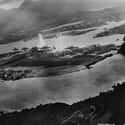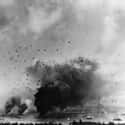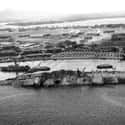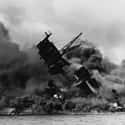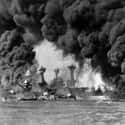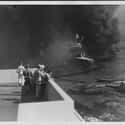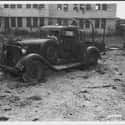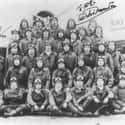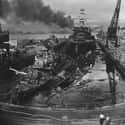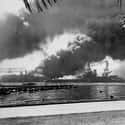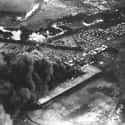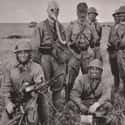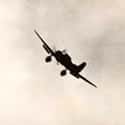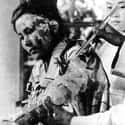-
(#1) The 'Why?' Is Glossed Over
University student Mayako Shibata told McClatchyDC in 2014 that she doesn't recall any classes that mentioned why the Japanese actually attacked Pearl Harbor. She did recall being told, however, that some members of the government opposed the decision.
The article goes on to say that, when Pearl Harbor was mentioned in the classroom, it was to situate the attack, which "involved more than 300 aircraft, two bombing waves and six aircraft carriers," in a context that served to downplay the event in relation to WWII more broadly.
-
(#2) A Preemptive Strike Was The Only Option
Japanese Redditor /u/Karmago related this lesson in 2014:
External pressures placed upon Japan by the US such as the formation of the ABCD line (American, British, Chinese, Dutch) as well as the trade and resource embargoes that the US imposed on Japan were seen as acts of aggression. This led Japanese military leaders to believe that there was no other option but to launch a preemptive strike on the US.
-
(#3) It's Part of A Much Larger Picture
Japanese Redditor /u/ywja shares the role of the Pearl Harbor attack in Japanese lessons on WWII:
Japan had been fighting the Second Sino-Japanese War since 1937. Of course Pearl Harbor was a huge event. But in order to understand the Far East situation at that time, one needs to go back to 1937, or to the Manchurian Incident in 1931, or even further. This is the standard narrative, and the clash with the US is sort of the final stage of the war. That may be one of the reasons why Japanese don't put so much emphasis on Pearl Harbor. It's not an event that symbolizes the whole experience.
-
(#4) It's 'Less Than A Paragraph'
From Japanese Redditor /u/Centricflow:
The attack on Pearl Harbor was taught less than a paragraph (from the textbook in 2002). Just stating the event, when, where, and why briefly. And then they had the black and white picture of U.S.S. Arizona surrounded in black smoke, tilted sideways, and sinking in the ocean.
-
(#5) It's All About The Oil
Redditor /u/kylejn says a Japanese high school history class taught the following:
We didn't talk about Pearl Harbor specifically but the war in general. In a nutshell, the Japanese believed that the three superpowers in the world were going to boil down to the Soviet Union, the United States, and Japan. When the US cut off oil shipments, Japan figured that they would need to attack and needed to do it sooner rather than later. Hence, Pearl Harbor and Japan's attack on the United States.
-
(#6) Consequences Are In The Spotlight
Redditor /u/tophmcmasterson gives some perspective from behind the desk:
I'm an English teacher at a public JHS and elementary schools in Japan, and the emphasis is definitely more on the bombs and the consequences of war and why it should be avoided.
-
(#7) Teachers Were 'Distraught'
From Redditor /u/kneeseekingarrow:
I lived on a Japanese island called Okinawa, but on a military base. Our school was off base, and the Japanese women taught it as if they were very saddened and distraught about the whole incident. A lot of Japanese didn't [think] Pearl Harbor should have happened.
-
(#8) The Attack Happened On December 8
A minor note, but worth mentioning, from Redditor /u/ywja:
The biggest difference is that this attack happened on December 8, 1941, in Japan time and people remember it as such.
-
(#9) The Lessons Are Basically 'US-Approved'
From teacher and Redditor /u/cheetahbear:
I'm an English teacher in Japan and was invited to a lecture (my school really wanted me there) about this. The teacher spelled the problems that led Japan to war, then led a discussion. It ended with the children agreeing, that Japan had no right to wage war, and that the US acted rightly, having no choice but to retaliate. In another, less formal setting, a teacher/friend gave a quick talk to about 6 children, lauding MacArthur and explaining why declaring war on Japan was the appropriate response and why peace is so important. In short, the ww2 lessons would be US approved. At the same time though, on a subtle level, it seemed rehearsed. Not 100%, just enough to give a sliver of doubt.
-
(#10) 'Very Objectively, With Zero Emotion'
Redditor /u/AsiaExpert, after translating a modern Japanese textbook:
It translates simply as "on 1941, December 8th [this was the time it was in Japan during the attack], the Japanese task force attacked the American Pacific Fleet in port at Hawaii with the intent to deal a devastating blow. This was an attempt to acquire control of the seas. Simultaneous to the attack, Japanese forces launched attacks against British forces in Asia and moved with the intention of seizing Singapore." It was written very objectively, with zero emotion.
-
(#11) It Is 'Just A Footnote'
Quotes from Japanese visitors to the Pearl Harbor memorial regarding what they were taught about the attack, via The New York Times, December 7, 1985, "For Most Japanese, Pearl Harbor is Just a Footnote":
- ''People aren't taught about this in school.''
- ''Wars are often full of treacheries like that, aren't they? I don't think many people of my generation [in their 20s] think about the war anyway. It is only one piece of knowledge for the entrance examination.''
- "[T]here is a very popular saying, 'Let the past drift away with the water' that fits Japanese sentiments.''
- ''Japanese should remember Pearl Harbor, and Americans should remember Hiroshima.''
-
(#12) For Japan, The Conflict Had Already Been Ongoing
According to Redditor /u/ywja, the attack on Pearl Harbor, when seen in a more global context, was really the beginning of the end of a war Japan had been fighting since 1937. Instead of the attack being seen as a catastrophic turning point that drew the US into WWII, it's merely seen by the Japanese as one more battle on a list. As Redditor /u/NotAlwaysSarcastic corroborated:
You make a good point on why Pearl Harbor is so significant for Americans. For the Japanese and actually to all the other participants of WWII, it was only one battle, although it's more significant than many others.
-
(#13) 'Surprise' Attack Is Not The Descriptive Term
Japanese Redditor /u/CentricFlow remembered feeling surprised by the "surprise attack" descriptor in her US history books, and the detail with which American textbooks emphasized WWII along with many of its specific battles:
When I moved to the US and started studying US history in high school, it felt that there were more information about what Japan did during WWII... The biggest difference with the Pearl Harbor information in the US textbook, in my opinion, was the wording, "Surprise attack." It felt like the word "Surprise" was emphasized strongly, when in the Japanese text books did not.
-
(#14) Post-WWII Recovery Is Emphasized More Than The Conflict Itself
Japanese Redditor /u/CentricFlow recalled lessons focusing more on the recovery and post-colonial period than on the conflict itself:
Japanese here. My very first "history" lesson in grade school was in 6th grade (around 2002). What I could recall from 6th grade was that the textbook did emphasize more on the Meiji-Taisho period and post WWII recovery period, rather than WWII itself. I think we covered WWII subject for couple of days and that was it.
New Random Displays Display All By Ranking
About This Tool
Shinzo Abe went to Pearl Harbor to mourn and became the first current prime minister of Japan to visit Pearl Harbor. However, Pearl Harbor has always been controversial in history, and textbooks of various countries may have taught different opinions. Someone posted on the social media site Reddit and asked how the Japanese viewed the Pearl Harbor incident. This is indeed a very interesting topic.
Some netizens who have lived and studied in Japan answered the question, one of them replied that the general contents in the history book all hint that Japan was forced to be involved in World War II because of the political situation. The random tool shows 14 controversial things about how Pearl Harbor in Japanese books.
Our data comes from Ranker, If you want to participate in the ranking of items displayed on this page, please click here.











